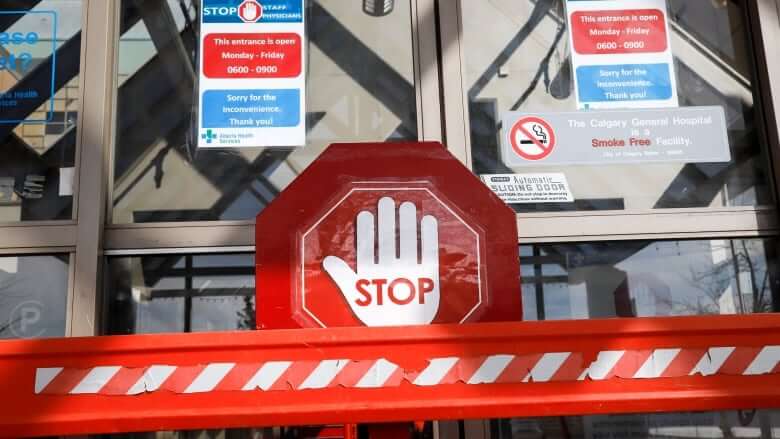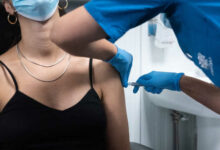COVID-19 spreading faster in Alberta than during peak of 3rd wave

Health and infectious disease experts say the rate at which COVID-19 cases are growing in Alberta is alarming, as it spreads faster than during the height of the pandemic’s third wave.
Public health experts concerned by Alberta premier’s claim that pandemic is over
The R-value, which represents the number of people infected by each infected person, was 1.48 (with a confidence interval of 1.38-1.59) in Alberta as of Sunday, according to Alberta Health.
That number — which has doubled in recent weeks — means 100 people with the virus will spread it to 148 others.
“The current R-value provincewide is one of the highest we’ve seen throughout the pandemic. So although the numbers are low today, the rate of viral spread is really as fast as we’ve seen at any other point during the pandemic,” said Craig Jenne, an immunologist and microbiologist at the University of Calgary.
“This really is the foundation for what everybody refers to as exponential growth … it is definitely laying the potential and the groundwork for a large surge of viral cases in the coming weeks.”
During the pandemic’s third wave, when around 1,500 new cases were being reported in Alberta each day, the R-value hovered around 1.15.
A rising R-value is more concerning than rising case numbers, says Carolyn Colijn, a Canada 150 research chair in mathematics for infection and public health at Simon Fraser University.
“It’s faster and faster increases, not just increases,” she said. “So that change not only is a pretty big change, but it’s also a change from declining to growing.”
Case numbers and positivity rates are currently low, but surging, driven by the more infectious delta variant. Alberta had 1,173 active cases on Tuesday with a test positivity rate of 2.54 per cent.
“Those are all indicators that we’re on our way to a fourth wave,” said Dr. James Talbot, a former chief medical officer for the province and a public health adjunct professor at the University of Alberta.
“For me, if I had family members or friends or neighbours that I knew weren’t immunized, my alarm bells would be going off right now.”
Of particular concern, Talbot said, is how many people remain unvaccinated. Vaccination provides strong protection against contracting COVID-19, and more protection against serious outcomes.
Of Alberta’s total population, 35.8 per cent of people still haven’t received a single vaccine shot (25 per cent of those eligible) and 45.7 per cent aren’t fully vaccinated, according to Alberta Health.
That means more than 1.5 million people in the province, about half of whom are children under 12 and are not eligible to be vaccinated, still have no protection against COVID-19.
“It’s like forest fire season,” Talbot said, “25 per cent [unvaccinated] is like having 25 per cent dry wood kindling in the forest, and you get a hot enough blaze with the delta variant — it’s not going to be good.”
Talbot said doctors expect most new cases will be among unvaccinated people.
“They have a choice. They can get immunized, in which case their chances of having a severe outcome are one in 100,000, or one in a million. Or they can choose to wait for the virus to infect them, in which case the chances of getting serious disease are about [one in 100],” he said.
Talbot says there are also concerns for those who contract COVID-19 but aren’t hospitalized, who may still experience a lengthy, unpleasant illness or long-term disability. There are also concerns for immuno-compromised people for whom vaccines don’t offer as much protection.
As for what’s causing the increased spread, Jenne said there are likely multiple drivers. The province lifted public health restrictions on July 1, and many people are no longer wearing masks or are holding larger gatherings indoors. He said contact tracing will be an important element in understanding this possible, new wave.
The source of transmission for 40 per cent of active cases is unknown. As of July 16, Alberta Health Services had 2,095 case investigators and contact tracers, down from 2,500 earlier in the pandemic.
“If this trend continues, we will once again be facing a situation where we need extra [contact tracing] staff to stay on top of the newly identified cases every day,” Jenne said.
Jenne said there are some positives — with so many older people vaccinated, surging cases may not translate into the same mortality rates as in previous waves.
But there are still unknowns.
“I think the remaining question is, though, how big will this surge get?”








Redes Sociais - Comentários